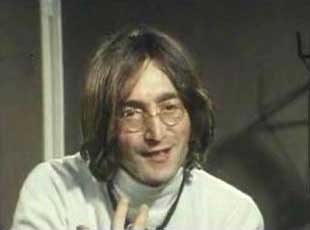 ABOUT THIS INTERVIEW:
In 1968, John Lennon expressed an interest in overseeing the production of a movie based on his first two books, 'In His Own Write' and 'A Spaniard In The
Works.' While
a film of his books was never made, a play was produced. Victor Spinetti directed the play adaptation, entitled 'In His
Own Write.' The play opened June 18th 1968 at the Old Vic Theatre in London. A book of the screenplay written by Adrienne Kennedy and Victor Spinetti based on John's characters was also published in 1968.
ABOUT THIS INTERVIEW:
In 1968, John Lennon expressed an interest in overseeing the production of a movie based on his first two books, 'In His Own Write' and 'A Spaniard In The
Works.' While
a film of his books was never made, a play was produced. Victor Spinetti directed the play adaptation, entitled 'In His
Own Write.' The play opened June 18th 1968 at the Old Vic Theatre in London. A book of the screenplay written by Adrienne Kennedy and Victor Spinetti based on John's characters was also published in 1968.
On June 6th 1968, Peter Lewis chatted with Lennon and Spinetti about the new play. The filmed interview would air on BBC-2 as part of the arts program 'Release.'
John discusses the impetus for his short-story writing as an early expression of his lifelong attitudes, and describes the meaning behind
a few of the characters and concepts in the books and play.
During the discussion, Lennon mentions 'Beanos,' referring to the popular, long-running comic book in Britain. The Beano was first published
in 1938, and still continues as a popular magazine today.
Victor Spinetti is famous for his acting roles in the Beatles' first two motion pictures, 'A Hard Day's Night' and 'Help!' as well as their made-for-TV
film 'Magical Mystery Tour.'
In the Sixties, the Old Vic Theatre was the home of the National Theatre Company, who have since found a permanent home at the Royal National Theatre in Lambeth.
These days, the Old Vic Theatre is well looked after -- with Kevin Spacey as the artistic director, Lord Attenborough on the Trust Board, and Sir Elton John as Chairman of the Board.
- Jay Spangler, www.beatlesinterviews.org
JOHN: "When I saw the rehearsal of it, I got quite emotional, as if Iíd written it. I mean, I knew in my heart of hearts
who was who and what the book was saying, but not enough. I was too involved with it when it was written. And any criticism it had was either just
rubbish or still only writing about what was on the paper. So it took something like this to happen to make me see what I was about THEN, you
know."
Q: "Well, an awful lot of the play is about radio and TV."
JOHN: "Well I mean, thatís all I ever heard, didnít I."
Q: "Yeah."
JOHN: "I mean you go home..."
VICTOR: "Comic books. You got the church..."
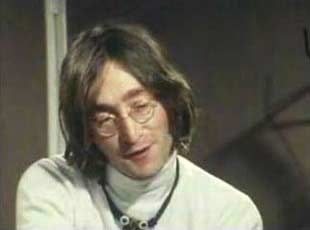 JOHN: (comically) "You got your comic books, your classic comics, your Beanos."
JOHN: (comically) "You got your comic books, your classic comics, your Beanos."
VICTOR: (comically) "Your church. Your classic comics. Your School."
JOHN: "Aye! Your School, your pub, and your TV, and your radio."
Q: "Exactly."
JOHN: "And that's it."
Q: "Funny thing you didnít put in pop music."
JOHN: "No, because up 'til then it hadnít hit me. Pop music didnít hit me 'til I was 16 and this is all before. The things that happened
before 16."
VICTOR: "But itís not really Johnís childhood. Itís all of ours, really. Isnít it, John?"
JOHN: (giggling) "It is. Weíre all one, Victor. Weíre all one, arenĎt we."
VICTOR: "It is, you know."
JOHN: "I mean, whatís going on?"
Q: "Thereís another thing about this boy. And that is, he wonít talk plain English. He invents his own language..."
JOHN: "Yeah."
Q: "...which is what you did when you started writing, when your books started coming out."
JOHN: "Well, yeah. That was just a hangover from school, you know. I mean, I used to make the lads laugh with that scene, talking like that,
and writing poetry. I used to write them and just give them to friends to laugh at, and that was the end of it. So when they all go down in a book,
when it turns into a book or a play, etcetera, etcetera, itís just my style of humor."
Q: "Instead of saying 'for example' as I was going to, say 'forsample.'"
VICTOR: "Forsample, yes! And 'He was astoundaghast'!"
JOHN: "Well, some of them... Ďcuz I was never any good at spelling, all me life. You know, I never quite got the idea of spelling. English
and writing, fine. But actually spelling the words.
So... And also I typed a lot of the book, and I can only do it very slowly with a finger. So the stories would be very short because I couldnít be
bothered going on."
VICTOR: (laughs)
JOHN: "And also Iíd spell it as you say it, like Latin really, you know. Or just try and do it the simplest way to get it over with. ĎCuz all Iím
trying to do is tell a story, and what the words is spelt like is irrelevant, really. But if they make you laugh because the word used to be spelt
like that, thatís great. But the thing is, the story. And the sound of the word."
Q: "A lot of people wrote about your book and said ďOh! James Joyce, Edward Lear,Ē and so on. What did you think when they said that?"
JOHN: "Well, when they said James Joyce I hadnít... I must have come across him at school but we hadnít done him like I remember doing
Shakespeare
and remember doing so-and-so. I remember doing Chaucer a bit, or somebody like him doing funny words. But I donít remember Joyce, you see. So, the
first thing they say -- 'Oh! Heís read James Joyce,' you know. So I hadnít. And so the first thing I do is buy Finniganís Wake and read a chapter. And
itís great, you know, and I dug it, and I felt as though he's an old friend. But I couldnít make it right through the book, and so I read a chapter
of Finniganís Wake and that was the end of it. So now I know what theyíre talking about. But I mean, he just went... he just didnít stop, you know.
Yeah."
Q: "What actually, though, had you read that you KNOW was important to you when you were young?"
JOHN: "Only kids books, you know. Alice In Wonderland. The poems are all from Jabberwocky... started me into that kick."
Q: "Did it."
 JOHN: "And drawing. I started trying to
draw like Ronald Searle when I was about eight. So there was Jabberwocky and Ronald Searle I was turning into by the time I was thirteen. You know,
I was determined to be Lewis Carroll (giggles) with a hint of Ronald Searle."
JOHN: "And drawing. I started trying to
draw like Ronald Searle when I was about eight. So there was Jabberwocky and Ronald Searle I was turning into by the time I was thirteen. You know,
I was determined to be Lewis Carroll (giggles) with a hint of Ronald Searle."
Q: "Were you a Sherlock Holmes reader? "
JOHN: "No. I had a holiday, after we first made it big as Beatles, in Tahiti. And there was nothing else on the boat but books. And Tahiti, we're
on all those Islands, great, but I still got into reading. So I was writing 'Spaniard In The Works' and I knew... I never got past a story longer
than a page. So I read a whole stack -- sort of ĎThe Madmanís Sherlock Holmes' where you get all the stories in one, and realized that every story
was the same story. So I just wrote one 'Shamrock Womlbs' after three weeks of Sherlock Holmes in Tahiti. And that was the end of it."
Q: "Thereís a very, very sad poem at the end of the play about Kakky Hargreaves who is some sort of person whose name changes during the
poem whoís gone lost. Who was Kakky Hargreaves?"
JOHN: "Well, nobody, you know. It was Kakky, or Cathy, or Tammy. So it was all those people. But the point is that you GOT it -- the sadness
that I wrote into it. But after you write something, a song or anything, you get the sadness and then you perform it or you put it on
paper and then thatís gone. And the only way you get the joy back of writing it or the sadness back, is when somebody like Victor or somebody else
comes and reads it to you, or acts it out. Like, when I first saw the rehearsal of the play, and they said these words back to me and I got the
sadness from Kakky Hargreaves like Iíd never heard it before."
Q: "You wrote that one when you were very young."
JOHN: "Yes. That was, sort of, pre-Beatle. Eighteen. Nineteen."
VICTOR: (laughs)
Q: "And have you written lately?"
JOHN: "Well I write, I think, all the time. So I mean, itís the same. I actually donít put it on paper so much these days, but it goes into
songs -- A lot of the same energy that went into those poems. I donít know what I actually do with the thoughts, but they come out either on film,
or on
paper, or on tape. Iíve just got lots of tape, which, I suppose if I put onto paper it would be a book. But itís just a matter of, do I want to make
those tapes into paper or make the tapes into records."
Q: "Does it feel the same to you when youíre writing something on paper and when youíre writing a song lyric?"
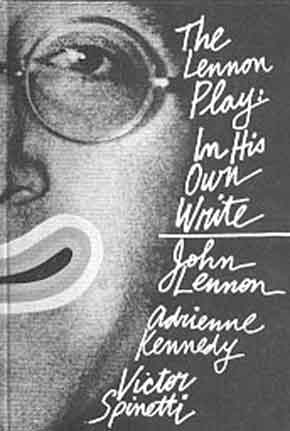 JOHN: "It does now. In the old days I used to think, if song writing was this... you know, 'I love you and you love me,' and my writing was
something else, you know. Even if I didnít think of it quite like that. But I just realized through Dylan and other people... BOB Dylan, not
Thomas... that it IS the same thing. Thatís what I didn't realize being so naive -- that you donít write pop songs, and then you DO THAT,
and then you DO THAT. Everything you do is the same thing, so do it the same way.
But sometimes Iíll write lyrics to a song first and then I'll get the same feeling as Kakky Hargreaves or a poem and then write the music to it
after. So then itís a poem, sung. But sometimes the tune comes and then you just put suitable words to fit the tune. If the tune is (sings)
'Doodle-loodle loodle-leh,' and then you have 'Shag-a-boo choo-cha.' You know, you have sound-words then, just the sound of it. ĎCuz it IS all
sound. Everything is vibrations, I believe, you know. Everything is sound, really, or vision. And just, the difference between sound and vision Iím
not quite sure about. But its all just (imitates a vibrating sound) 'vuh-wuh-wuh-wuh-wuh-wuh.'"
JOHN: "It does now. In the old days I used to think, if song writing was this... you know, 'I love you and you love me,' and my writing was
something else, you know. Even if I didnít think of it quite like that. But I just realized through Dylan and other people... BOB Dylan, not
Thomas... that it IS the same thing. Thatís what I didn't realize being so naive -- that you donít write pop songs, and then you DO THAT,
and then you DO THAT. Everything you do is the same thing, so do it the same way.
But sometimes Iíll write lyrics to a song first and then I'll get the same feeling as Kakky Hargreaves or a poem and then write the music to it
after. So then itís a poem, sung. But sometimes the tune comes and then you just put suitable words to fit the tune. If the tune is (sings)
'Doodle-loodle loodle-leh,' and then you have 'Shag-a-boo choo-cha.' You know, you have sound-words then, just the sound of it. ĎCuz it IS all
sound. Everything is vibrations, I believe, you know. Everything is sound, really, or vision. And just, the difference between sound and vision Iím
not quite sure about. But its all just (imitates a vibrating sound) 'vuh-wuh-wuh-wuh-wuh-wuh.'"
Q: "The boy (in the play) hates a lot of things and, in a way, you could say you were attacking these things -- like, organized religion,
and the way people teach you in school."
JOHN: "I feel the same now, really, about organized religion, education, and all those things that everybody is still laughing at. But I mean, I
expressed it THAT way THEN. I don't know how I'd express it now, you know. It'd be slightly different really. I've always sort of suspected
that there was a God, even when I thought I was an atheist. But I beleive it, so I am full of compassion, really, even still. I just hate things
less strenuously than I did. I haven't got as big of a chip about it, because maybe I've escaped out of it a bit. I think our society is run by
insane people for insane objectives. And I think that's what I sussed when I was sixteen and twelve, way down the line. But I expressed it
differently all through my life. It's the same thing I'm expressing all the time. But NOW I can put it into that sentence that I think we're being
run by maniacs for maniacal ends, you know. If anybody can put on paper what our government, and the American government, and the Russian,
Chinese... what they are all trying to do, and what they THINK they're doing, I'd be very pleased to know what they think they're doing. I think
they're all insane. But I am liable to be put away as insane for expressing that, you know. That's what is insane about it. I mean, don't you
agree?"
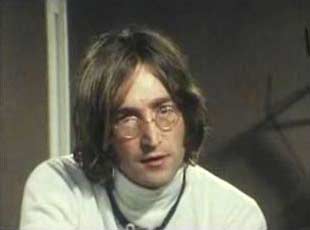 Q: "I do, actually."
Q: "I do, actually."
JOHN: "It's not just a bit strange. It's just INSANE, and nobody knows. Half the people watching this are going to be saying, 'What's he saying!
What's he saying!' You know... That you are being run by people who are insane, and you don't know."
VICTOR: "We are living in insane times, aren't we, you know. We really are."
Q: "Yeah. And the thing that you feel, all the way through, is that -- there is this boy trying to get out."
VICTOR: (laughs)
JOHN: "Well, I did, you see. (giggles) I got out. But that's just a sort of picture of somebody who is still in it. I mean, you get out in
your mind."
Q: "Yeah, all the time he is dreaming his way out."
JOHN: "But I mean, you do, until you actually physically get out of it."
Q: "Dream your way out into being Sherlock Holmes or..."
JOHN: "Whatever."
VICTOR: (agreeing) "Whatever."
Q: "At the end of the play there's this big family group and there's a great big family row."
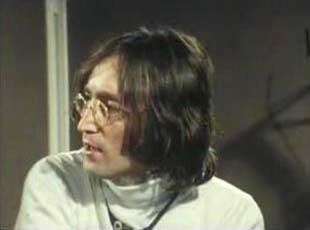 JOHN: (to Victor) "Is there?"
JOHN: (to Victor) "Is there?"
VICTOR: "Yes. Brummer Striving."
JOHN: "Oh! Brummer Striving."
Q: "It's all about Brummer Striving."
JOHN: "Yeah."
Q: "Do tell us about Brummer Striving."
JOHN: (giggling) "Brummer Striving is Brummer Striving -- all those jobs that people have that they don't want. And there's probably about
90 percent Brummer Strivers watching in at the moment."
VICTOR: "Yeah."
JOHN: "But you don't have to be a Brummer Striver, you see. It depends how involved in Brummer Striving you are. But Brummer
Striving -- Paul explained it at the beginning of the book. Uhh, it doesn't... (giggling) What does he say he was saying?
(paraphrasing) 'What is Brummer Striving? It isn't anything.'"
Source: Transcribed by www.beatlesinterviews.org from video and audio copies of the interview
|

